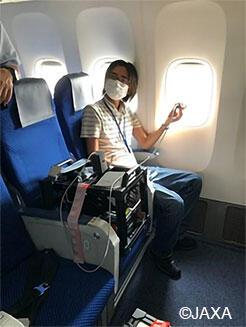JAXA and ANA launch Joint Research on Remote Sensing Observation of Atmospheric Components using Passenger Aircraft and Satellites
-Contributing global warming measures from sky and space-
September 28, 2020 (JST)
National Research & Development Agency
Japan Aerospace Exploration Agency (JAXA)
ANA HOLDINGS INC.
Japan Aerospace Exploration Agency (President: YAMAKAWA Hiroshi, hereinafter “JAXA") and ANA HOLDINGS INC. (Head office: Minato-ku, Tokyo, President and CEO: KATANOSAKA Shinya, hereinafter "ANAHD") are launching a joint research on utilizing passenger aircraft for remote sensing observation of atmospheric components in city areas.
TERADA Koji, Vice President of JAXA, commented “JAXA is pleased to announce this collaboration with ANAHD. I believe this research can deliver valuable data for supporting the efforts on reducing the greenhouse gas emission and methodology to observe the atmospheric components remotely from flying aircraft. Furthermore, we look forward to contributing to the Paris Agreement and the Sustainable Development Goals with this joint effort.”
“ANA is excited to work with the Japan Aerospace Exploration Agency on this important project to observe atmospheric conditions in urban areas across the globe,” said SHIBATA Koji, CEO of ANAHD’s Digital Design Lab. “ANA is committed to a sustainable world, and we believe that using passenger aircraft to capture greenhouse emission figures in urban areas will provide useful data for reducing the global carbon footprint. This partnership will be mutually beneficial as JAXA shares ANA’s deep commitment to social good and creating a more sustainable society.”
Since 2009, JAXA has been monitoring the increase of the greenhouse gas on a global scale by Greenhouse Gases Observing Satellite "IBUKI" (GOSAT)*1. The greenhouse gas emissions from city areas are estimated to account for approximately 70 - 80% of anthropogenic CO2 emissions. However, achieving both observations on the amount of greenhouse gas emissions associated with human activities in the city and on a global scale is difficult for satellites. In this joint research, the carry-on luggage sized the observation instrument developed by JAXA applying space technology will be placed in the cabin of passenger aircraft operated by ANA. This instrument observes the detailed concentration distribution of the atmospheric components such as carbon dioxide and nitrogen dioxide while flying over cities. The purpose of this research is to understand the emission distribution in city areas according to emission sources such as traffics and industries by combining the data obtained by aircraft and satellites such as "IBUKI". First, we start this observation experiment flight between Tokyo (Haneda) and Fukuoka.
Furthermore, this research aspires to contribute to the Paris Agreement*2 by providing useful data for considering measures to reduce emissions from cities and for evaluating the effect of emission reduction efforts.
Left: Graphics of the Greenhouse Gases Observing Satellite "IBUKI" (GOSAT)
Right: Image of the remote-sensing observation from the passenger aircraft cabin (Through the cabin window, the sunlight which is reflected off the ground surface is absorbed, and concentration level of the atmosphere is measured from the wavelength of the light.)
JAXA will verify the effectiveness of observation and estimation methods of atmospheric components observed remotely from an aircraft cabin. Also, by analyzing combined observation data from aircraft and satellites, JAXA will establish evaluation and validation methods for greenhouse gas emissions on an area basis which is more detailed scale than using satellite observation data alone.
ANAHD will investigate the possibility and feasibility of remote sensing as a way to utilize a passenger aircraft.
JAXA and ANAHD will implement this research to address global societal challenges, including environmental issues and contribute to the sustainable development of the society from space and sky.
*1 Greenhouse Gases Observing Satellite "IBUKI" (GOSAT)
https://global.jaxa.jp/projects/sat/gosat/
*2 The Paris Agreement, adopted at COP21 in 2015, aims to pursue efforts to limit the global temperature rise since before the industrial revolution to less than 1.5 degrees Celsius and to reduce global greenhouse gas emissions to practically zero in the second half of the 21st century, and requires countries to "submit a voluntary reduction target to the United Nations" and "take domestic measures to achieve the reduction target".

